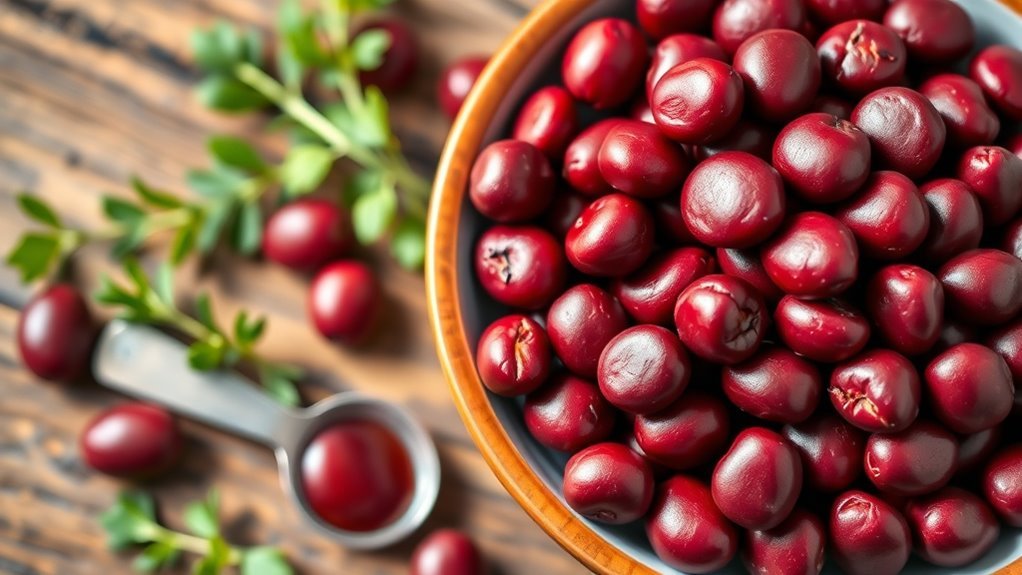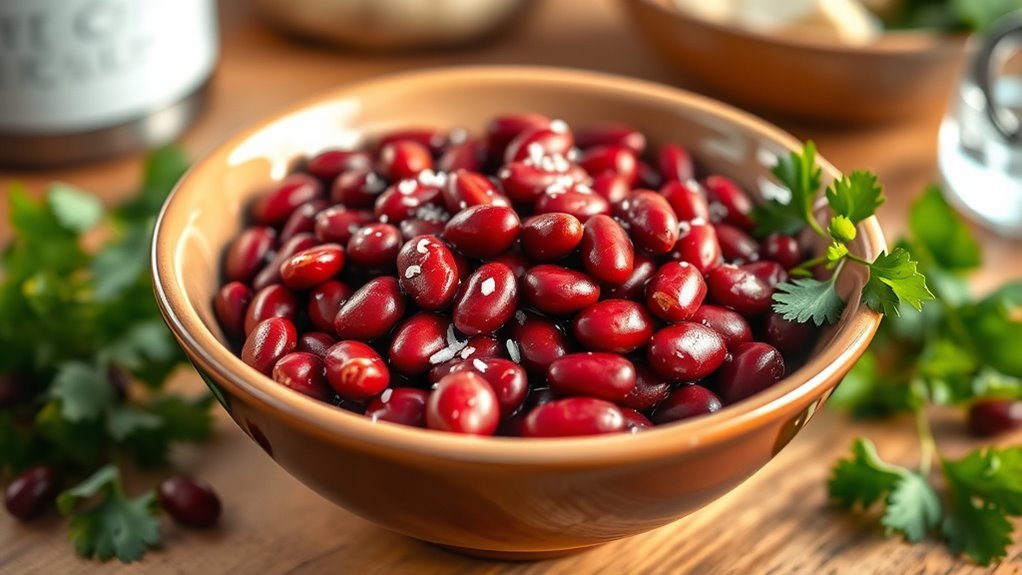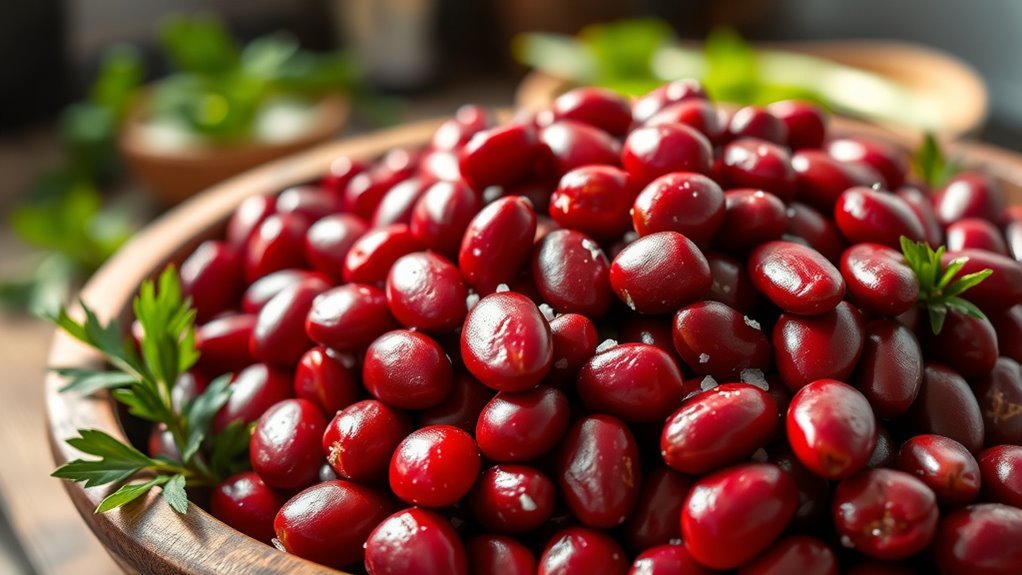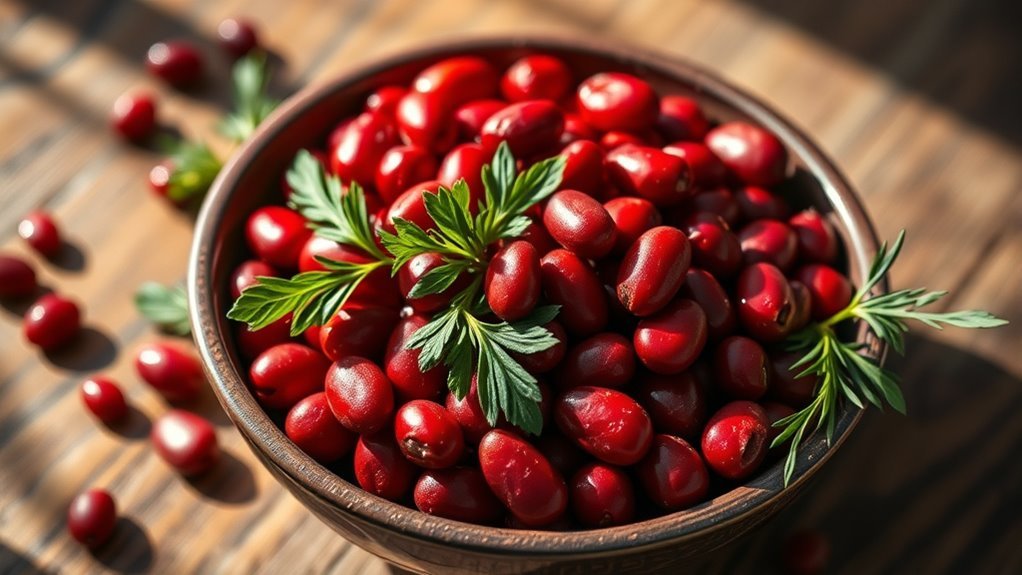Red beans aren’t keto-friendly due to their high carbohydrate content. A cup contains about 22 grams of total carbs, which can hinder your goal of maintaining a low-carb intake. Although they offer fiber and essential nutrients like iron and folate, portion control is vital. If you’re looking for low-carb alternatives or ways to fit beans into your keto lifestyle, there are better options available. Stick around to discover more alternatives and tips for a successful keto diet.
Understanding the Ketogenic Diet

When you plunge into the ketogenic diet, you’re fundamentally shifting your body’s primary energy source from carbohydrates to fats. This change is guided by ketogenic principles, which emphasize low carbohydrate intake, moderate protein consumption, and high fat intake. As you adapt, your body undergoes fat adaptation, where it becomes efficient at burning fat for fuel. This process can take several days to weeks, depending on individual metabolism. During this phase, you might experience symptoms like fatigue or cravings, commonly known as the “keto flu.” However, once you’re fully adapted, many find increased energy levels and enhanced mental clarity. Embracing this lifestyle can offer you freedom from sugar cravings and help maintain stable energy throughout the day, supporting your health goals.
Nutritional Profile of Red Beans

When considering red beans, it’s essential to look at their carbohydrate content, especially if you’re following a ketogenic diet. They’re not only a source of carbs but also packed with fiber and protein, which can support your overall health. Additionally, red beans provide various vitamins and minerals that contribute to a balanced diet.
Carbohydrate Content Overview
Although red beans are often celebrated for their nutritional benefits, their carbohydrate content can pose a challenge for those following a ketogenic diet. When examining various red bean varieties, you’ll find that they’re primarily composed of carbohydrates, making them less than ideal as a staple in a keto-friendly meal plan. Here are some key points to reflect on:
- Total Carbohydrates: Approximately 22 grams per cooked cup
- Net Carbs: Around 13-15 grams after accounting for fiber
- Carbohydrate Sources: Mainly starches and sugars
- Glycemic Index: Moderate, which can affect blood sugar
- Serving Size: Important to manage for carb counting
If you’re pursuing a keto lifestyle, understanding these factors is essential to maintaining your goals.
Fiber and Protein Benefits
While red beans may not fit seamlessly into a ketogenic diet due to their carbohydrate content, they do offer significant fiber and protein benefits that can enhance overall nutrition. These legumes are excellent fiber sources, providing about 13.1 grams per cup, which supports digestive health and can help you feel fuller longer. Additionally, the protein quality in red beans is remarkable; they contain essential amino acids that contribute to muscle repair and overall body function. Incorporating red beans into your meals can be a way to boost your intake of these vital nutrients, promoting a balanced diet. Just remember to take into account portion sizes, especially if you’re closely monitoring your carbohydrate intake. This way, you can enjoy their benefits without overindulging.
Vitamins and Minerals Present
Red beans are a powerhouse of vitamins and minerals, making them a valuable addition to any diet. Their impressive vitamin content and mineral richness can support your overall health in various ways. Including red beans in your meals can help you reap the benefits of:
- Folate: Essential for cell function and tissue growth.
- Iron: Crucial for oxygen transport in your blood.
- Magnesium: Supports muscle and nerve function.
- Potassium: Helps regulate blood pressure and fluid balance.
- Vitamin B6: Important for brain health and metabolism.
These nutrients work together to enhance your well-being, providing you with energy and supporting bodily functions. So, if you’re looking to enrich your diet, red beans might just be the perfect choice!
Carb Counts: Are Red Beans High in Carbs?

Wondering about the carb content of red beans? In a standard serving of red beans, you’ll find around 20 grams of carbohydrates, which can be considered high for those on a strict keto diet. When you look at carb comparison with other bean alternatives, like black soybeans or green beans, red beans do come out on the higher side. These alternatives typically contain fewer carbs, making them more suitable for keto lifestyles. If you’re trying to maintain a low-carb intake, it’s essential to be mindful of your portion sizes with red beans. However, if you’re not strictly adhering to keto, they can still fit into a balanced diet. Just keep your overall carb goals in mind!
Health Benefits of Red Beans
Beans are often celebrated for their nutritional profile, and red beans are no exception. They offer several health benefits that can enhance your overall well-being.
- Packed with fiber, promoting digestive health
- Rich in protein, supporting muscle repair
- Loaded with antioxidants, fighting free radicals
- Heart-healthy, helping to lower cholesterol levels
- Low in fat, making them a smart choice for weight management
Incorporating red beans into your diet can contribute to better heart health due to their ability to lower blood pressure and cholesterol. Their antioxidant properties also play a significant role in reducing inflammation and preventing chronic diseases. Embracing red beans can be a delicious step towards a healthier lifestyle while enjoying the freedom to savor varied flavors.
How to Incorporate Red Beans Into a Keto Diet
While many people associate a keto diet with avoiding carbohydrates, there are ways to thoughtfully incorporate red beans into your meal plan. Start by balancing your portion sizes; a small serving can add flavor and nutrition without derailing your carb count. Consider mixing red beans with low-carb vegetables in salads or stir-fries for added texture and taste. You can also create hearty soups or stews, where beans provide a satisfying base. For meal planning, try making a bean dip with spices, perfect for snacking. Remember, moderation is key, so keep track of your overall carb intake. With a bit of creativity and careful recipe ideas, you can enjoy red beans while staying committed to your keto lifestyle.
Alternatives to Red Beans for a Keto Lifestyle
If you’re looking for alternatives to red beans that fit a keto lifestyle, you’re in luck; there are several low-carb options that can provide similar texture and flavor. These keto substitutes can help you maintain your dietary goals while adding variety to your meals. Consider trying:
- Black soybeans: Low in carbs and high in protein.
- Zucchini: A versatile vegetable that can mimic the texture.
- Cauliflower: Great for making rice-like dishes.
- Chickpeas (in moderation): While slightly higher in carbs, they can be used sparingly.
- Green beans: A crunchy, low-carb option that pairs well with various dishes.
These alternatives not only keep your carb count low but also allow you the freedom to enjoy satisfying meals.
Frequently Asked Questions
Can I Eat Red Beans on a Strict Keto Diet?
Imagine a garden bursting with vibrant colors, each plant offering a unique taste. When it comes to your strict keto diet, red beans might not be the best pick. With their higher carb content, they can throw off your carb counting. Instead, consider keto alternatives like cauliflower or zucchini. These options provide freedom to create delicious meals while keeping your carb intake in check. Embrace variety while staying true to your keto goals!
How Do Red Beans Compare to Other Legumes?
When comparing red beans to other legumes, you’ll find variations in nutritional profiles and carbohydrate content. Red beans are higher in fiber but also contain more carbs than some other legumes, like black soybeans. This means they can impact your diet differently. If you’re considering legumes, it’s key to balance their nutritional benefits against their carb levels, ensuring they fit into your overall dietary goals and preferences.
Are Canned Red Beans Keto-Friendly?
So, you think canned beans are the ultimate keto snack, huh? Well, not quite. While they’re convenient, canned red beans aren’t the best keto alternative due to their higher carb content. If you’re following a strict keto diet, you’ll want to contemplate lower-carb options like zucchini or cauliflower instead. But hey, if you enjoy them in moderation and balance your overall carb intake, you might just find a way to make it work!
What Portion Size of Red Beans Is Acceptable on Keto?
When considering portion size for red beans on a keto diet, it’s essential to practice portion control. A serving size of about ¼ cup can keep your carb intake in check. Red beans contain around 20 grams of carbs per cup, so sticking to smaller servings helps maintain ketosis. Always monitor how your body responds; individual tolerance can vary. Enjoy red beans mindfully to balance your cravings with your dietary goals.
Do Red Beans Affect Ketosis Levels?
When considering the ketosis impact of red beans, it’s essential to look at their carbohydrate content. While they’re nutritious, red beans can contain more carbs than you might want on a keto diet. If you consume them in moderation, you might not disrupt ketosis considerably, but larger portions could affect your levels. It’s all about balance and ensuring you stay within your daily carb limits to maintain that desired state of ketosis.
Frequently Asked Questions about Red Beans and the Keto Diet
1. Are red beans keto-friendly?
Red beans are generally not considered keto-friendly due to their relatively high carbohydrate content. A typical serving of cooked red beans contains around 20 grams of carbohydrates, with about 6-7 grams of fiber, leading to a net carb count of approximately 13-14 grams per serving. This can make it challenging to incorporate them into a standard ketogenic diet, which typically limits daily carbohydrate intake to around 20-50 grams.
2. What is the net carb count for red beans?
The net carb count for red beans can vary slightly based on how they are prepared, but on average, one half-cup serving of cooked red beans has about 20 grams of total carbohydrates, with around 6-7 grams of fiber. Therefore, the net carbs would be approximately 13-14 grams. This is important to consider if you are trying to maintain ketosis while following a low-carb diet.
3. Can I eat red beans in moderation on a keto diet?
While red beans are not typically recommended for strict ketogenic diets, some individuals may choose to incorporate them in very small amounts as part of a more flexible low-carb approach. If you can carefully monitor your overall carbohydrate intake and ensure that other meals remain low in carbs, a small serving of red beans might fit into your diet. However, it’s crucial to remain aware of your body’s response and adjust accordingly.
4. What are some keto-friendly alternatives to red beans?
If you’re looking for keto-friendly alternatives to red beans, consider options like black soybeans, green beans, or cauliflower. Black soybeans, for instance, are lower in net carbs and can provide a similar texture in recipes. Additionally, vegetables like zucchini or mushrooms can also serve as versatile substitutes in various dishes while keeping your carb intake low.
5. What health benefits do red beans offer?
Red beans are a good source of protein, fiber, vitamins, and minerals, such as iron and potassium. They can support digestive health through their high fiber content and may help regulate blood sugar levels. However, due to their carb content, they are best enjoyed in moderation or avoided on a strict keto diet. Including them in a balanced diet outside of keto can be beneficial for overall health.
References
- https://en.wikipedia.org/wiki/Red_bean
- https://www.healthline.com/nutrition/keto-diet-foods
- https://www.ncbi.nlm.nih.gov/pmc/articles/PMC6313445/
- https://www.webmd.com/diet/what-is-the-keto-diet
- https://www.mayoclinic.org/healthy-lifestyle/nutrition-and-healthy-eating/expert-answers/keto-diet/faq-20461564
- https://www.hsph.harvard.edu/nutritionsource/healthy-eating-plate/
- https://www.diabetes.org/healthy-living/recipes-nutrition/nutrition-basics/carbohydrates-and-diabetes
- https://www.cdc.gov/healthyweight/healthy_eating/index.html


